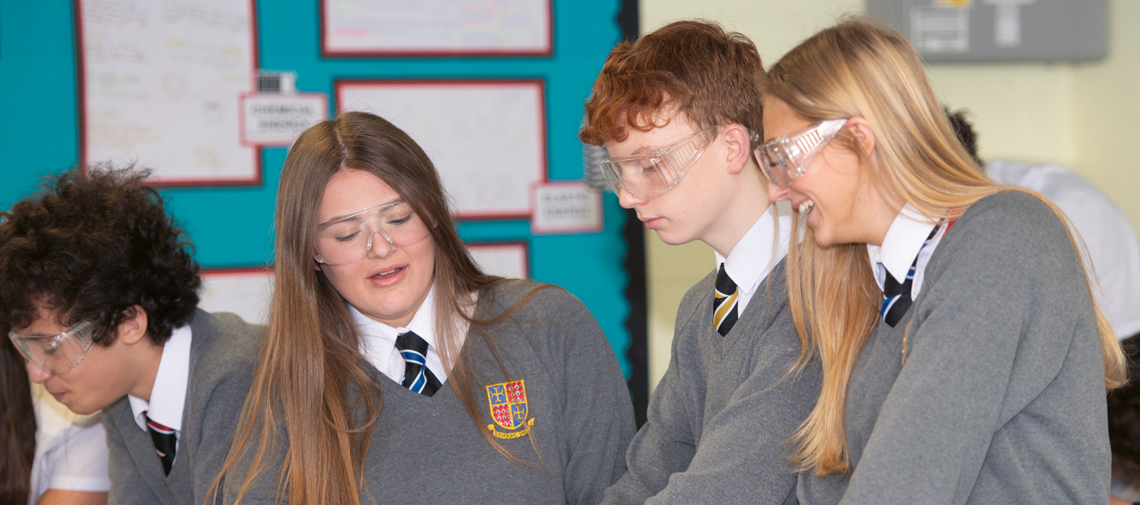How one MAT is developing partnerships to support its pupils and community

‘For young people to achieve their full potential, they and those around them need to feel they have a stake in society,’ says Chris Willis, executive headteacher at Gosport and Fareham Multi Academy Trust (GFM). Developing that mindset is something the Trust has been keen to address in the former naval town of Gosport, where a generation has been left disenfranchised by cutbacks to services and key industries.
‘Our vision is to create better opportunities for our students by being innovative in our schools and supporting regeneration across our community,’ says Chris Willis. With two large secondary schools, two junior schools and one special school, GFM is one of the largest employers in Gosport – and therefore, he argues, a key player in developing a sustainable future for the town. ‘Around 26,000 cars commute away from Gosport every day and there is high unemployment locally. Our strategy is to equip our young people with the cultural capital to work and thrive here.’ To deliver on this, the Trust is establishing long-term collaborations and a pipeline of funding networks with community and business organisations.
Committed leadership
It’s clear that creating partnerships at this level requires a leadership team deeply invested in the locality and dedicated to making things happen – and the fact that GFM was formed as a local MAT (in 2017) drives its work in the community. In terms of expertise, executive principal Kirstie Andrew-Power has led school improvement programmes for the DfE and co-authored a book on raising achievement through parental engagement. The Trust’s financial director has a background of working in the community sector, and the chief executive, Ian Potter, who was previously a headteacher at one of the MAT founder schools, coordinates the International School Leadership Development Network.
With the recruitment crisis in teaching particularly acute in areas like Gosport, the leadership team has a vested interest in developing a skilled and knowledgeable workforce that might consider education as a career. More broadly, the team wants to equip disadvantaged young people with the confidence and awareness to aspire to a range of roles in the local economy. ‘Gosport is on a coastal peninsula and the marine and maritime sector is a huge employer, alongside many STEM-related industries,’ says Chris Willis. ‘Yet significant numbers of apprenticeships and jobs are not being filled because young people haven’t had exposure to the types of role on offer.’
An entrepreneurial outlook
GFM’s solution is radical. ‘We’ve been moving away from traditional specialisms towards applied skills and subjects,’ says Chris Willis. ‘We’re developing a leading-edge STEM and Marine and Maritime curriculum, combined with a reworked careers provision of relevant employment pathways, including apprenticeship routes.’
The Trust has introduced a strong entrepreneurial strand to its sixth form and also partnered with employers in the area to co-fund the country’s first school-based STEM centre. Opened in 2019, the Gosport STEM centre was delivered with financial support from the Solent LEP, BAE Systems, the NEU, local engineering business FliteTrak, and signage company Signs Express. The centre provides hands-on activities that help students understand how an engineer thinks and works. There’s also a dedicated iSTEM+ space for professional learning to assist teachers and support staff. More broadly, GFM is a partner in the pan-Gosport STEM strategy and is working with QinetiQ engineering to organise work experience for students. Young people who have gained on-site experience with QinetiQ are now running a young leaders programme at the MAT to support their peers in identifying routes to employment.
Another important initiative has been to partner with watersports provider the Andrew Simpson Centre, to open a marine and maritime training hub. This partnership offers a Level 3 BTEC in Sports and Outdoors, along with Royal Yachting Association qualifications, so that students in Years 12 and 13 have clear and additional routes in employment with the marine and maritime industry. Further, GFM has secured £10,000 from Abri Homes and £10,000 from the Beacon Foundation to support entrepreneurial young people under 25 in developing their own small businesses within the town.
A community hub
A big part of the Trust’s drive to address disadvantage and hardship among families has come through the development of an on-site community centre. Opened in April, the centre is the result of a partnership with the Royal Navy and Royal Marines Charity (which awarded £400,000 to cover much of the project cost). The hub is staffed by a team who work with community organisations and charities to address poor local health statistics by supporting the mental and physical wellbeing of residents.
‘It’s a lovely, welcoming building that is open to everyone in our community,’ says Chris Willis. ‘We run a community larder and kitchen, where people can learn to cook, and the space is also hired out for community wellness classes such as Pilates. This summer Abri Homes donated £8,000 so that we could run a Good Grub Club through the holidays.’ Charities connected to the armed forces also offer free programmes, such as a ten-week nurturing programme to help parents and a Talking Teens service for young people.
In a sense, says Chris Willis, GFM is taking on a wider social development remit that picks up on where programmes such as SureStart left off after cutbacks. ‘We recently match-funded a grant of £5,000 from ArtsWork to establish an art therapy service for young people and families. We’re also partnering with sports clubs and organisations to establish the Gosport Community Sports Foundation, where professional coaches will deliver elite training sessions for our students. And we’re collaborating with the local parish church to co-fund a youth and community project worker who will look at how we can create opportunities for our students to work with charities in areas of need locally around the world.’
Further reading
Sign up to FundEd to access grants and funding support

